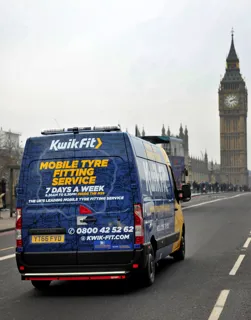Kwik Fit is arguing that tyre selection and driving style will be even more critical to maximise performance and longevity, and minimise fleet costs, when fitted to plug-in vehicles.
The automotive maintenance and repair company says tyre replacement decisions and driving style will be key to limiting tyre consumption during an electric model’s fleet life.
Primarily this is because the weight of electric batteries means that these vehicles are up to 30% heavier than equivalent internal combustion engine models, putting more strain on the tyres and taking longer to stop.
Andy Fern, fleet sales director at Kwik Fit, explains: “The infancy of the sector means that it is too early to determine exactly how real world tyre wear will compare to internal combustion engine models, but it is business-critical that fleet operators monitor how tyre life is impacted by the unique characteristics of plug-in vehicles.”
To maximise electric vehicle performance, premium brand tyre manufacturers are developing dedicated tyres and that choice will increase as the market develops.
First generation electric vehicles have been invariably equipped with ‘narrow tyres’, to reduce rolling resistance and help increase range between charges, says Kwik Fit. On the downside, a reduced contact patch with the road increases the demand on tyres and can potentially increase wear rates.
Tyre labelling introduced in November 2012 classifies performance in respect of fuel efficiency (rolling resistance), wet grip and noise levels and tyre manufacturers are focused on ensuring the right balance between these factors.
Fern said: “Rolling resistance is of critical importance for an electric vehicle to achieve a stated range. Therefore, premium branded tyres are likely to be even more essential than on petrol and diesel models.
“Similarly, without the noise from an internal combustion engine, the road noise created by tyres will become more significant, and as a result many drivers and fleet managers will want tyres with low noise characteristics for their full-electric vehicles.”
Harsh acceleration and cornering in an electric vehicle, coupled with its additional weight, will have a major impact on tyre wear and tear, so smooth driving will improve tyre life and maintain performance.
Fern concluded: “Drivers of plug-in vehicles typically adopt a smoother driving style with an increased focus on efficiency to preserve battery range.
“Battery technology is continually improving in terms of providing drivers with additional mileage between charging, but range remains a critical factor in the shift to electric.
“Tyre longevity is influenced by numerous factors - tyre selection, in-life maintenance and driver behaviour - and those characteristics have a greater dominance in respect of electric vehicles, predominantly due to their added weight.
“As always, premium brand tyres will deliver maximum longevity when compared with cheaper tyres, while rolling resistance assumes a greater importance if zero-emission range is to be maximised.”
Kwik Fit has national UK coverage of more than 600 service centres and 200 mobile tyre fitting vehicles.






















Login to comment
Comments
No comments have been made yet.